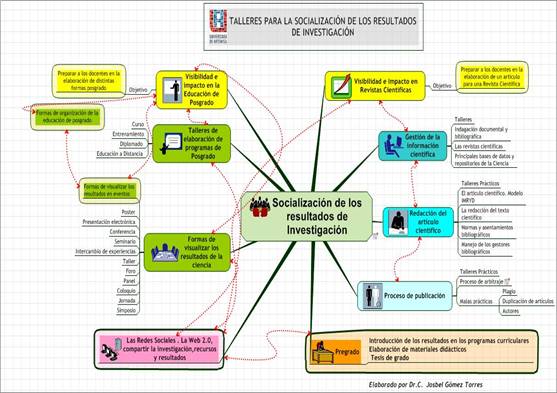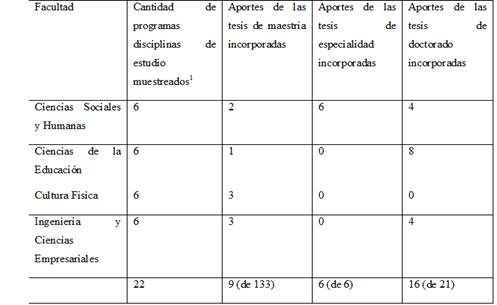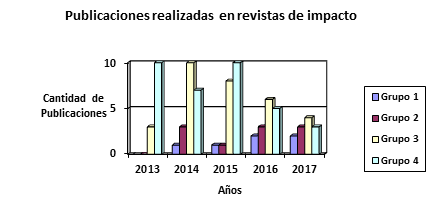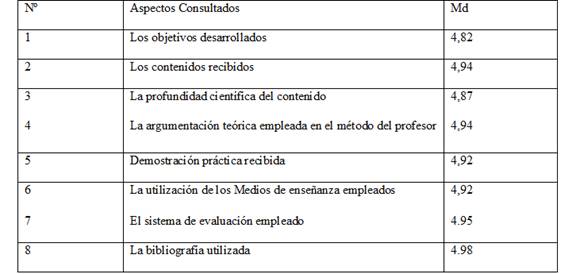Mi SciELO
Servicios Personalizados
Articulo
Indicadores
-
 Citado por SciELO
Citado por SciELO
Links relacionados
-
 Similares en
SciELO
Similares en
SciELO
Compartir
EduSol
versión On-line ISSN 1729-8091
EduSol vol.22 no.79 Guantánamo abr.-jun. 2022 Epub 20-Abr-2022
Original article
Socialization and visibility of educational research at the University of Artemisa
1Universidad de Artemisa. Cuba.
2Dirección de Ciencia y Técnica del Ministerio de Educación. Cuba.
The professionals of the University of Artemisa, when concluding their research results, feel the need to socialize, disseminate and share them with the national and international scientific community. However, a diagnosis carried out in the different faculties of the Institution, using research methods and techniques, revealed a lack of knowledge to achieve this purpose. The purpose of this article is to show the results of the implementation of theoretical-practical workshops with the objective of increasing the socialization and visibility of the scientific educational production of the institution.
Key words: Socialization of results; theoretical-practical workshops; scientific publications; research; impact journals
Introduction
Since ancient times, universities have been recognized as the institutions with the greatest production of scientific knowledge, and it is necessary for this research to be visible outside the university that produces it. Socializing and publishing research articles shows the strength of a university.
The scientific method requires that the knowledge generated by science be publicly disseminated so that the scientific community can contrast its reliability, verify its validity and generalize its results. Socialization, visibility, introduction, generalization and impact are essential components of scientific research. All of them promote conditions and social relations to develop the processes of communication, publication, dissemination, recognition and popularization of research results. Domínguez, 2015.
Among the different spaces or forms of socialization available to university teachers and students to make research results visible and available to members of the scientific community are: scientific events at different levels, presentation and discussion of research reports, awards, books, undergraduate and graduate programs, web 2.0 and publication in impact journals, among others.
All these forms are an expression of the scientific discussion derived from the scientific results, understood as the finished products that the research project should provide from the material and human resources available and the use of scientific methods, techniques and procedures, with a view to achieving its specific objectives and consequently contribute to the solution of the problem and always represent a certain type of theoretical and/or applied knowledge about the object. (Castellanos Simons & Others, 2005)
Scientific research is the main axis of science, technology and innovation. Through it, the main scientific results are systematized and new knowledge is provided for the solution of problems that arise in the practice of the different areas of knowledge. These results contribute to the economic, social and technological development of society.
In the educational context, "it is from educational research that multidisciplinary scientific knowledge about educational reality is built, constituted in scientific-technical results" (Castellanos, 2005.p.29).
Torres (2016) defines educational research as "the professional process of growth of accumulated knowledge about the educational act, which is carried out with transformation purposes for the social good, taking care to achieve the greatest possible objectivity."(p.32).
The socialization of the results of educational research allows its introduction, generalization and recognition by the scientific community. Different authors such as: Cadera y Narváez, 2009; Moreno, 2009; Valdés Pérez, 2010; Escalona, 2008; Keeling, 2010, 2019; Boza y Keeling, 2019; Inmamura, 2018; Boza, 2019, Chirino et al, 2012; Chirino et al, 2012; have addressed socialization as a key aspect for the appropriation of culture, norms, knowledge and exchange between subjects, from theoretical positions that support it as a component of scientific activity.
The socialization of academic knowledge constitutes "the process of collectivization and extension (...) of all the intellectual production generated in the institutions where academic research takes place (...). This process implies the access, participation, exchange and social interrelation of all interested subjects. Also, the appropriation and transmission of all available information (...) as well as the enrichment of the system of knowledge and values of individuals, from a humanistic perspective, for the sake of their better and common social and professional performance" Valdés Pérez, 2010, p.36).
Moreno (2009), for his part, considers socialization as "(...) a component of the educational scientific activity that allows promoting conditions and social relations for the communication, publication, dissemination, recognition and popularization of educational research resultsˮ (p.4).
For Escalona (2008) it is "an indispensable condition to be able to introduce scientific results and then generalize them and as ways for the visualization of the results of pedagogical and educational sciences" (p.33).
Interesting is the statement of Imamura (2018) who expresses the socialization of scientific production as:
"A process that promotes the conditions for the generation, use, dissemination, and access to scientific production, in order to achieve visibility and impact of scientific results in society. It implies providing the opportunity and the right to use it, fostering the capacities and skills to use it, as well as actions to facilitate its use and generation". (p.27).
For his part, Boza (2019) in addressing the socialization, publication and recognition of scientific results states that:
"Socialization is considered the result to be achieved, which assumes as a key element the mediation process of the subjects involved in educational scientific activity. It favors in teachers, managers and researchers, the exchange, transmission, identification, recording and appropriation of information and new knowledge, results of the scientific activity they carry out individually and collectively" (p.34).
Today, when so many possibilities of doing science and participating in it are opening up to us, the possibility of knowing and getting to know the ways and means of presenting scientific results is also opening up.
The academic community commonly recognizes the maxim: research that is not socialized or published does not exist. And it is a great reality, because only in this way, the results derived from scientific research will be discussed and its contribution will be part of the universal scientific knowledge.
Therefore, it is of vital importance for teachers to socialize and publish the results of their research because they contribute to a true collective construction of scientific knowledge. When participating in several socialization spaces and publishing an article in a highly recognized scientific journal, a contribution is made to the management and dissemination of knowledge; it helps other professionals to advance in a specific field of research.
On the other hand, it strengthens the strategies for the construction of the scientific text, which leads to the strengthening of the teacher's confidence when presenting his/her results in different spaces of socialization and to the development of competences to communicate orally in a clear and coherent way.
It also brings benefits to the teacher and the university in general; to the teacher, by recognizing the work he/she has done as a researcher and expert in his/her field inside and outside the country, obtaining scholarships and being associated to international research projects; to the university it brings visibility and international prestige, recognition in research quality and a better performance in international relations.
At the University of Artemisa, the socialization and visibility of scientific production is a problem to be solved. A diagnosis carried out in the four faculties that comprise it (Educational Sciences, Engineering and Business Sciences, Physical Culture and Social and Humanistic Sciences); as well as the analysis of the institution's Science and Technique balance reports from 2013 to 2019, reflect the lack of knowledge on the part of teachers of the forms and procedures necessary to visualize and socialize their research results derived from projects, the production of scientific articles for highly recognized journals is low, and Web 2.0 resources are inefficient to communicate, share and contrast the results obtained.
The purpose of this article is to show the results of the implementation of theoretical-practical workshops with the objective of increasing the socialization and visibility of the educational scientific production of teachers at the University of Artemisa.
Development
To carry out the study conducted, the authors, as part of the project "Theoretical - Methodological Conception for Knowledge Management", planned three basic tasks: the first related to an initial diagnosis to know the state of the raised problem, it was framed in the period from April 2013 to June 2017, the second was related to the preparation and assessment of the theoretical-practical workshops to be conducted to solve the raised problem and a third that consisted in the implementation of the proposed workshops.
For the fulfillment of the first task, a group of research methods and instruments were applied (participant observation, surveys, interviews, document analysis) with the objective of knowing where the socialization, visibility and impact of their research results were heading. All this under the conception of the following indicators:
Number of educational research results socialized in undergraduate education.
Number of educational research results socialized in graduate education.
Number of results of educational research socialized in scientific journals of impact.
Number of results of educational research socialized in scientific events.
Number of results of educational research socialized on the Web. 2.0
During the diagnosis, the criteria of 160 teachers (21 doctors, 6 specialists, 133 masters) were taken into account, distributed in a random sample of 40 researchers from the four faculties of the university institution.
Similarly, the results of educational research socialized in 6 scientific events held internationally and 5 with territorial character in Cuba, the balance reports of the Directorate of Science and Technique of the University in the years from 2013 to 2017 were reviewed. The postgraduate courses and their relationship with the research carried out during the period were also quantified, as well as, the publications of the 160 teachers sampled in impact journals.
For the fulfillment of the second task , the authors of this article were guided by the leader of the research project, the preparation of the workshops (from a theoretical-practical conception), to prepare the teachers of the University of Artemisa in the topics of socialization of research results and thus raise the visibility of the educational scientific production of the institution taking advantage of the following spaces: undergraduate, graduate education, participation in scientific events, publication in impact journals and socialization in social networks .
Once the program of the proposed theoretical-practical workshops was completed, it was made available to a group of specialists with the purpose of evaluating its viability for its subsequent application. Fifteen specialists were selected, all of them doctors of science from the University of Artemisa. For the validation of the workshop proposal, the method “Related to expert judgments " was applied. Although it is an alternative for synthesizing and evaluating this type of consultation, we agree with (Pérez, 2010) that in this type of inquiry the observations are not recorded directly from the units of analysis and therefore do not constitute the validation in practice of the result we have arrived at, but to some extent, they indicate a certain range of objectivity in our partial conclusions.
The implementation of the theoretical-practical workshops (third planned task), was developed during the period 2016-2018, with a Team Teaching integrated by four teachers from the University of Artemisa and two from the Enrique José Varona University of Pedagogical Sciences. The socialization spaces conceived in its implementation were: (graph 1):
At the undergraduate level (to train them in the integration of the knowledge resulting from scientific activity to the programs of the disciplines of the basic curriculum elaborated by the National Commissions of careers and to the programs of the own and optional/elective curricula determined by the University's Career Collective).
Graduate Education (to train them in the elaboration of graduate programs for the integration of their knowledge resulting from scientific activity).
Participation in events, congresses and others (elaboration of papers, essays, monographs, posters, panels).
Publications in scientific journals (writing scientific articles, databases, publication standards).
Web 2.0 (training them in the integration of their knowledge resulting from scientific activity to the benefits and socialization resources of social networks).
 Source: Self elaboration
Source: Self elaborationGraph 1: Outline of the theoretical-practical workshops for the socialization of research results.
Analysis and results obtained in the diagnosis performed
Regarding the indicator number of educational research results socialized in undergraduate classes, significant deficiencies were found in relation to the integration of the contributions obtained by researchers in their classes. It was found in the review of the programs of the disciplines where the 160 teachers taught that 19.3% of them (31 teachers) had incorporated the results of their doctoral, specialty or master's theses into the programs of the disciplines. The rest (129), in interviews conducted, were aware of the regulations that existed by the university's Training Directorate to do so, however, they stated that they did not know or were not prepared on how to integrate them into the program of the discipline or subject derived from it, nor to present it as a new one in the curriculum itself or as an optional-elective one. Table 1 shows the results obtained in the review of the programs of the disciplines.
Table 1: Contributions of educational research results from academic training to the programs of the disciplines.

Source: Self elaboration
A second analysis, aimed at the number of educational research results socialized in graduate education under the premise of the MES (2019) "the contents of graduate education should address relevant research results or transcendent issues with the purpose of complementing or updating the knowledge of the professionals who receive them" (p.34 ) ; it corroborated that the results obtained from the product of the educational research carried out, with important theoretical and practical transformations, are not integrated into graduate education in order to socialize them as results and thus be able to update the teachers of the university and the territory of Artemisa.
This result was obtained by comparing the postgraduate programs in force in the period under study with the results of 120 master's theses, 4 specialties and 18 doctoral theses belonging to the sample studied. In addition, a questionnaire was used to verify the teachers' lack of knowledge in the elaboration of postgraduate programs in their different forms of organization based on their research results.
The third analysis was aimed at verifying how the indicator of publications resulting from teachers' educational research in scientific journals of impact has manifested itself in recent years. For this purpose, a review was made of the balance reports of science and technical activity in the years 2013 to 2017 and it turned out, as shown in graph 2 , that:
The number of publications has had ups and downs, with a tendency to decrease.
There is still a poor production of scientific articles, if we take into account the number of professors that make up the different faculties.
Teachers continue to publish in journals of groups 3 and 4 and do not make their results visible in journals of international prestige such as those of groups 1 and 2.
There is a predominance of publications in http//www.monografías.com, reports on magnetic media (CDs) of events and congresses, as well as other publications with a low impact factor and scientific visibility.
Similarly, in interviews conducted and in discussions on these topics in the meetings of the teaching departments, it has been proven that they are not familiar with the databases for publishing, the most prestigious journals in the country and abroad in the field of educational research. Ninety-three percent of the professors do not know how to upload an article from the platform used by the journal to do so and also do not know the IMRYD format (introduction, materials and methods, results, discussion and conclusions), which is the international standard for publication in any prestigious journal.
The teachers of the University of Artemisa are not sufficiently prepared to publish their scientific results in impact journals, so it is necessary to prepare them in order to achieve their visibility as authors and what they do in the field of education.
 Source: based on the Science and Technology balance reports of the University of Artemisa in the period 2013-2017
Source: based on the Science and Technology balance reports of the University of Artemisa in the period 2013-2017Graph 2: Number of publications in high impact journals
In the indicator referring to the number of results of educational research socialized in scientific events, we can say, after an analysis of the participant observation of the authors in several events and interviews with 80 teachers of the sample (50%), that in this aspect an improvement is observed, and this is the result of the increase in the level of demand of the calls for papers in the presentation format that include a pre-established template that favors the speaker. There is a better preparation in terms of presentation of their results, but it should be noted that there are still flaws in the monograph, essay and poster formats.
Finally, the number of educational research results socialized in Web 2.0 was evaluated, i.e., the analyses were directed to the dissemination and visibility in internet resources among which are: sharing relevant information in a Blog, work with Boolean search engines, work in research repositories, Open Access and other resources that are totally unknown by 96 % of the respondents.
Regarding the evaluation of the theoretical-practical workshops conceived by the experts consulted in the application of the Conexo method in expert opinions, it was determined that, in order to synthesize the results obtained, the status of the aspects consulted was established from the calculation of the median for grouped data, typical of an ordinal scaling in which it is intended to discriminate with greater precision the central tendency that characterizes each of the aspects consulted. The results are shown in Table 2.
The results of the status of all the aspects consulted exceed the 4th position (Fairly Adequate) on the ordinal scale increasing to the 5th; from which it can be inferred that there is a generalized acceptance among the experts consulted of the fundamental components of the proposal. Even a relative in-depth analysis of the results in all aspects does not reveal any difference of criteria among them. Furthermore, they considered the proposal pertinent and timely and valued it with the possibility of being implemented.
Main results obtained in the application of the theoretical-practical workshops.
The results obtained with the application of the theoretical-practical workshops show progress in the use of the socialization spaces by the teachers who participated in them. Although there is still a tendency to take more advantage of events, forums, workshops and conferences. The levels of socialization in journals and postgraduate programs have increased, although the use of distance education and visibility in social networks is still insufficient. (Graph 3).
 Source: Self elaboration
Source: Self elaborationGraph 3: Results of the implementation of the workshops by semesters in some socialization scenarios
On the other hand, a growth in the teachers involved was observed, as they developed practical skills for the search of relevant information, the quality in the elaboration of the text of the article, the preparation of posters, the assembly of panels, forum-debates, the elaboration of postgraduate courses and diploma courses.
The socialization of educational scientific activity allows the promotion of conditions and social relations for the communication, publication, dissemination, recognition and popularization of educational research results. They serve as an interaction between the management of scientific-educational information and knowledge with the introduction and generalization in educational practice within the framework of educational research.
The institution and its professionals must understand that there are different forms of socialization (thesis defense events, scientific sessions, presentation and discussion of research reports, scientific events, awards and publications, among other forms) that are an expression of scientific debate and that make it possible to make research results visible and available to members of the educational community. However, not all professionals are aware of this.
Scientific visibility is related to the amount of materials and publications produced by a university that can be seen by the scientific community. To achieve greater scientific visibility, it is necessary to publish a greater number of books; creating a scientific journal; adapting our journals according to the criteria of the databases; creating institutional policies of incentives for the publication of manuscripts; training researchers in all publication processes.
Conclusions
The insertion of scientific activity and its results in the undergraduate and graduate levels constitutes essential elements to undertake and know the scientific knowledge derived from educational research, which favors the updating of scientific knowledge and its deepening.
The socialization of research results for the University of Artemisa should become a strategic axis, since the science produced by its teachers has to be communicated, shared and contrasted in different conditions and social relations.
The workshops proposed during the year have gradually raised the visibility of the research results of its participants. They have shown that publishing in journals that meet international quality and visibility standards is an effective way to increase the dissemination and circulation, recruitment and international relations of the research produced by full-time and part-time teachers of the different faculties of the University of Artemisa and its Municipal University Centers
Referencias Bibliográficas
Boza, J. (2019). Socialización, publicación y reconocimiento de resultados científicos en el Sistema Nacional de Educación (Tesis Doctoral). Universidad de La Habana. Cuba. [ Links ]
Boza, J. & Keeling Alvarez, M. (2019). La socialización de los resultados de la investigación educativa. Revista Pedagogía Profesional. 17, p.15-20. [ Links ]
Cadera, S. & Narváez, E. (2009). Manual de redacción de artículos científicos: comprender y producir textos escritos para investigar. México, D.F.: Universidad de Occidente. [ Links ]
Castellanos Simons, B. (2005). Esquema conceptual, referencial y operativo sobre la investigación educativa. La Habana: Centro de Estudios Educacionales. [ Links ]
Chirino Ramos, M. V.; Vázquez Conde, J. P.; del Canto Colls, C.; Escalona Serrano, E.; y Suarez Méndez, C. (2012). La introducción de resultados científico como etapa de la investigación educativa. La Habana.: Universidad de Ciencias Pedagógicas Enrique José Varona. [ Links ]
Domínguez Granda, J. B. (2015). Manual de investigación científica. Perú: Universidad Católica de los Ángeles de Chimbote. [ Links ]
Escalona Serrano, E. (2008). Estrategia de introducción de resultados de investigación en el ámbito de la actividad científica educacional (Tesis Doctoral). Instituto Central de Ciencias Pedagógicas (ICCP), Cuba. [ Links ]
Inmamura, J. I. (2018). Concepción teórico-metodológica para la socialización de la producción científica de la Facultad de Educación en Ciencias Técnicas de la Universidad de Ciencias Pedagógicas Enrique José Varona. (Tesis Doctoral). Universidad de Ciencias Pedagógicas Enrique José Varona, Cuba. [ Links ]
Keeling Alvarez, M. (2010). Concepción teórico-metodológica para favorecer el desarrollo de la actividad científica educacional de docentes e investigadores desde el Centro de Documentación e Información Pedagógica de la Universidad de Ciencias Pedagógicas Enrique José Varona (Tesis Doctoral). Universidad de Ciencias Pedagógicas Enrique José Varona, Cuba. [ Links ]
Moreno, M. J. (2009). Procedimientos para la socialización de resultados de la investigación educativa. Universidad de la Habana. [ Links ]
Torres, P. (2016). Retos de la investigación educativa cubana actual. Aportes a su tratamiento. Instituto Central de Ciencias Pedagógicas. [ Links ]
Valdés Pérez, M. G. (2010). Comportamiento de la producción y la difusión académica en tres universidades cubanas mediante sus principales canales de comunicación científica (1990-2005) (Tesis Doctoral). Universidad de La Habana. [ Links ]
Received: October 20, 2021; Accepted: January 02, 2022











 texto en
texto en 



